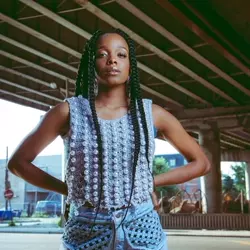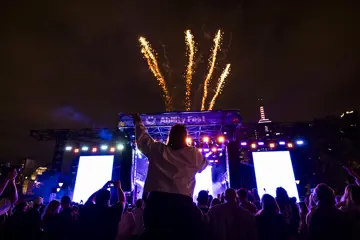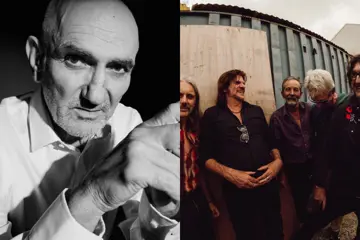 Jamila Woods
Jamila WoodsTalk to Jamila Woods and you're likely to hear about Chicago. About the city she grew up in and returned to. About its poetry scene, its literary history and the musical community (Noname, Chance The Rapper, Donnie Trumpet, Saba) of which she's a part. About her work with Young Chicago Authors, a nonprofit organisation working with teenagers in literacy, poetry, performance. About how her debut LP HEAVN is, in many ways, about Chicago. And how, in the face of gun violence and police violence, Chicago remains robust; using art to combat the ills of American society.
"It's natural, when you're from a place as brilliant as Chicago, that you want to let people know about it," says Woods. "People are really into Chicago music right now, but I think they essentialise what Chicago is: that it's a very violent place, that there are these really negative connotations to it. Ever since I was young, I remember writing down that my greatest fear was to be misunderstood. And I feel like a lot of people misunderstand Chicago. I think that'll always be a part of my work; because it's where I come from, who I am."
Woods - who's speaking to The Music not from Chicago but New York, where she's just had a photoshoot for Vogue - grew up in the predominantly white neighbourhood of Beverly, the eldest of four siblings. They'd choreograph dances together, sometimes to songs they'd make up. Woods grew up singing in choirs, listening to Stevie Wonder, dreaming of being a veterinarian/singer/actor ("a triple threat!" she laughs). Her path to making music began when she missed out on studying it; hoping to do music or theatre studies at an after-school program, she instead got stuck with her third-choice class: performance poetry. "But then I ended up falling in love with poetry and kept writing until I graduated high school," Woods recounts. "[And] I wanted to go to college anywhere they had a vibrant poetry scene."
Woods went to Brown University in Providence, Rhode Island. Initially, she took a load of science classes, thinking that - inspired by her parents, who're both physicians - she'd go into medicine. "I grew up hearing the stories of how they'd take care of their patients. To me, it was so fascinating; I loved hearing what they did all day," Woods offers. "I was taking all these science classes, thinking, 'Maybe I'll do Pre-med'. Then I realised I was more fascinated by the stories of the patients, and my parents' relationships to them, as opposed to the actual science."
Don't miss a beat with our FREE daily newsletter
So she leaned into theatre and Africana studies, a class on the poetry of hip hop proving particularly influential. Woods was more into the backstage elements of theatre, drawn to dramaturgy ("I didn't even know that word existed before college," Woods admits, "it's basically the person who's in charge of making sure the world of the play is authentic"). Everyone else in her classes was talking about moving to New York or Los Angeles, but Woods wanted to return to Chicago. Moving back home, she threw herself into its theatre scene, hopping between various theatres as director's assistant, intern or dramaturge.
Woods also began making music, playing in the alt-soul duo M&O; she was 'Milo', her bandmate Owen Hill was 'Otis'. They self-released two LPs, 2012's The Joy and 2014's Almost Us. When Hill moved away, Woods set about making her own music, songs often inspired by the poems she was writing. At first, she was unsure about being a solo artist: "What I was feeling when I set out making it was a little bit lost and a little bit insecure, questioning whether I was capable of making music on my own." But a confidence-boosting step came when she decided she was going to record under her given name.
"I started to feel, 'I don't want to compartmentalise my art anymore'," Woods says. "I want it to feel like - whatever I'm making, I want it to be clearly coming from me. I'd already been performing poetry under my name, so it felt right to make music under my name, too."
The first song Woods wrote was Blk Girl Soldier, to a beat by producer Jus Cuz. A searing, righteous study of "black girlhood", from ancestral slaves through activists (Harriet Tubman, Rosa Parks, Audre Lorde, Angela Davis, Assata Shakur) to the victims of male violence and abandoned justice, be they the endless nameless or Rekia Boyd, who was shot and killed by an off-duty police officer in 2012. The second song, Holy, was about finding self-satisfaction and self-belief, even when alone. "Once I had those songs," Woods says, "I really started being able to think about this as a project; about what other stories I wanted to tell, how I wanted to flesh out this world," Woods says.
Setting out to make HEAVN its own self-contained world, Woods drew on her history with dramaturgy. "I love to think about that no matter what I'm making," she offers. "Whether it's the world of a poem I'm writing, the world of a song I'm writing or the world of an album I'm making. I want every piece - whether it's the album cover, the skits between the songs, the sounds in the songs, the lyrics - to feel as if they're all cohesive, part of the one world."
Through listening to the whole of HEAVN - with its songs about growing up in Chicago, how Jamila got her name, loneliness, Afrofuturism, social activism - Woods believes listeners can get a sense of who she is. "If you took one song out of context, you'd only ever just get a piece of me, but all the songs reflect who I am," she says. "Obviously, I'm still figuring out who I am, and figuring it out through making [music]. People can contain multitudes. There isn't just one version of yourself. I'm proud of how, when I listen back to it, it feels very authentic as to how I was feeling and the things that were on my mind as I was making it."















